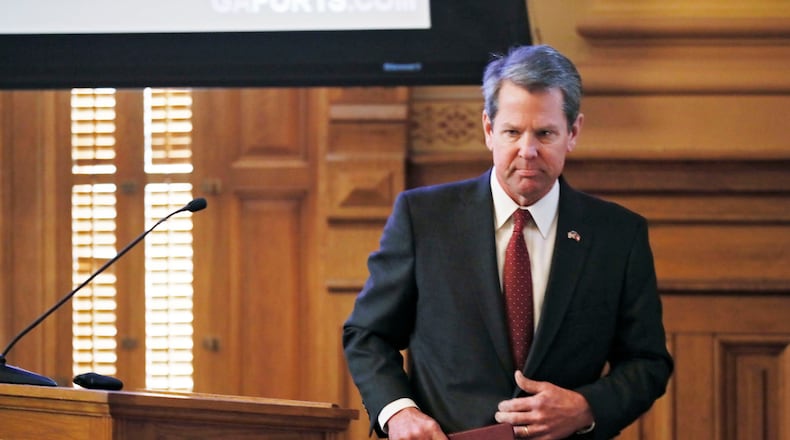About this time 13 years ago the state had enough money in reserves to pay for schools, roads, policing, prisons, courts and all the other things the government does.
For a couple of days.
The Great Recession had siphoned its saving account, even after deep spending cuts across the whole of state government whittled agency budgets.
Fast-forward to the new state government of the post-coronavirus-pandemic-shutdown era that this fall reported having $16 billion in two reserves, which is about half a year’s worth of the state budget.
The remarkable turnaround started with an economic recovery in the 2010s, with then-Gov. Nathan Deal holding the line on spending and slowly using surpluses to rebuild the account the state holds money in for the next recession, when it might be needed to keep the government running.
But that growth in reserves greatly accelerated after the post-COVID-19 reopening of the economy in April and May of 2020, as massive federal spending, higher wages, inflation, state policy changes and other factors brought an avalanche of tax revenue like the state of Georgia has never seen before.
“The big thing is, look at 2021 and 2022,” said Richard Dunn, the director of the Office of Planning and Budget. “Typically, we are used to seeing 3 1/2, 4% growth. In those years it went up 13% and 23%.”
Combine that with the fact that “nobody knew what was going to happen coming out of the pandemic,” Dunn said, so Gov. Brian Kemp and lawmakers budgeted relatively conservatively and didn’t spend much of that tax money coming in.
That meant the state ran a $3.7 billion surplus in fiscal 2021 and a $6.6 billion surplus in fiscal 2022, and in October, it reported a $5.3 billion surplus for the fiscal year that ended June 30.
That has allowed Kemp and lawmakers to rebate $3 billion to taxpayers, hike salaries of teachers and state employees, improve technology in the government and boost spending in everything from education and public health programs to prisons, policing and road construction.
With $16 billion banked, another big tax cut, higher salaries in at least some high-turnover areas — such as the prisons and juvenile justice system — and an increase in spending in some agencies is likely to be on the table during the upcoming 2024 General Assembly session, even though the growth in tax collections has slowed most of this year.
Preparing for the next fiscal rainy day
The National Association of State Budget Officers reported earlier this year that “rainy day” reserves nationally had reached historic levels after a glut of tax revenue rolled in following the pandemic shutdown.
The group reported states had accumulated $164 billion in reserves by fiscal 2022, with huge increases occurring over the past few years.
“Georgia is not in a unique position,” Dunn said. “Other states are seeing the same thing.”
And for many of the same reasons.
The pandemic hit as Georgia was close to winding up its annual legislative session.
Much of the fight the previous few months had been over Kemp’s call for agencies to cut spending because he was concerned about a possible economic downturn in 2020. When the pandemic hit, a big chunk of the economy in Georgia and the rest of the country shut down.
Once the shutdown was lifted — Georgia was among the first states to reopen — the state feared it would have to use up much of its reserves to fund the government, and lawmakers returned in June and cut spending on education and other areas by 10%.
But several things happened that changed the dynamic for the state and allowed it to boost spending, rebate tax money and build historic reserves.
A few months before most Georgians had even heard of COVID, legislators passed a law making it easier for the state to collect taxes from online sales. The timing was fortuitous, since once the pandemic hit, Georgians started a wave of buying things from Amazon and other online retailers, providing the state with a revenue boost.
The federal government reacted to the pandemic by sending out big money to Americans, with some getting more in unemployment when they were laid off during the shutdown than they had received in wages. The administrations of both Presidents Donald Trump and Joe Biden backed billions of dollars for states and schools districts.
“Once we got into the pandemic, the feds started pumping money out, and that hasn’t really stopped,” said Rep. David Wilkerson, D-Powder Springs.
Credit: Alyssa Pointer/AJC
Credit: Alyssa Pointer/AJC
State reports show federal spending as part of Georgia’s budget rose from $14.4 billion in fiscal 2020 to $18.65 billion by fiscal 2023.
That doesn’t include $4.8 billion in federal COVID relief funds bound for Georgia that Biden and Democrats in Congress approved in 2021, and that Kemp allocated for rural broadband services, local water and sewer projects, and grants to business impacted by the shutdown.
Pent-up demand from the shutdown and inflation brought in more sales tax money. Unemployment plummeted as the economy improved and employers had to pay higher wages, meaning higher state income tax collections. Direct federal benefits were taxed by the state as well. The stock market jumped, and taxes from capital gains also ballooned state coffers.
Georgia’s economy has also been on the upswing in recent years as companies have expanded, particularly in the electric-vehicle industry. The Kemp administration has been front and center when business expansions were announced, boosting his political credentials in Georgia — he handily won reelection last year — and nationally.
“The governor’s tenure will be marked by how he responded to COVID,” said Senate Appropriations Chairman Blake Tillery, R-Vidalia. “The governor deserves credit. He personally views his legacy as what he has done for economic development for every area of the state.”
Credit: Natrice Miller/AJC
Credit: Natrice Miller/AJC
Limits on spending the money
The governor reacted to the inflow of money by giving lawmakers conservative budget estimates. Because the General Assembly can’t spend more tax money than the governor says will come in during a fiscal year, the chief executive of the state controls the size of budget.
During fiscal 2023, for example, he estimated a huge drop in state revenue that didn’t happen. Lawmakers had to budget as if the drop was going to occur, so the state had plenty of money left over at the end of the fiscal year, increasing the reserves to the now-record $16 billion.
“They have been rigorously underestimating our revenue,” said state Sen. Nan Orrock, D-Atlanta, a member of the Senate’s budget committee. “It’s an artificially created surplus.
“While we have waiting lists for services everywhere you look, we have people dying behind bars because of the lack of (medical) treatment and staffing, we have people with mental health issues and people suffering from addictions .... we’re failing to put money on the table to provide services to Georgians.”
Credit: Arvin Temkar/AJC
Credit: Arvin Temkar/AJC
Orrock served as a House floor leader for Democratic Gov. Zell Miller in the 1990s and Kemp is just repeating what past governors have done when it comes to estimating how much money the state will have to spend.
“It’s a time-honored tradition that you low-ball the revenue estimate so that then you have the money to do what the governor wants to do,” she said.
It’s not like Kemp and lawmakers have completely skimped.
The state has increased spending in many areas. K-12 schools are receiving a record amount of money. Lawmakers have pushed for big increases in spending on mental health services, something that lagged before the pandemic but House Speaker David Ralston made a priority before he died in 2022. More money has gone into state policing.
And Democrats have joined their Republican colleagues to vote for income and property tax rebates the past few years, as well as cuts in state income tax rates.
Some Republicans would like further cuts to the income tax rate, especially with the state holding $11 billion in an “undesignated” reserve fund, meaning it’s not necessarily set aside for any particular program or purpose.
“We are taxing our citizens an extra $11 billion that we are not appropriating because we feel like we have met all the needs,” state Sen. Bill Cowsert, R-Athens, said last week during a meeting on industry tax breaks.
Wilkerson said Kemp has, so far, resisted spending reserves on things with ongoing, long-term costs to the state and put extra money, such as the federal COVID relief funds backed by the Biden administration, into one-time expenses such as water and sewer projects.
“He’s basically managed the ballgame,” Wilkerson said. “He has managed it well. I will give him credit where credit is due. But I have to give Biden credit, too.”
About the Author
Keep Reading
The Latest
Featured




